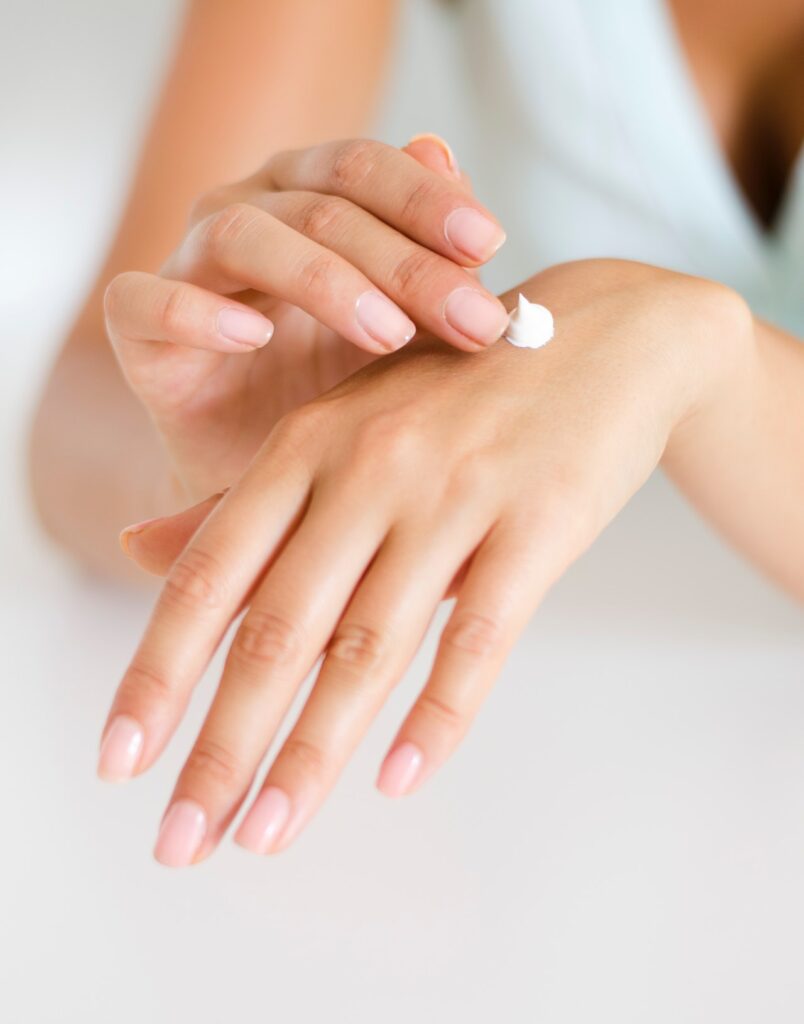Tag: b complex
Radiate Beauty with the B Complex!
I’ve said it before, and I’ll say it again: when it comes to maintaining the health of our hair and skin, nutrition is key.

That’s because there are many nutrients we get from our diet that are essential for the maintenance of tissues with high cell turnover and regeneration – i.e. our hair and skin! Trust me, when it comes to beauty that radiates from the inside and out, a healthy diet will set you up for success.
There are a group of nutrients in particular that really make a difference in the health and appearance of hair and skin – the B complex, which is a combination of eight essential B vitamins. Today I will break down the B complex in a little more detail, so you can understand the difference between each of these B vitamins, and how they play a role in your physical health and appearance.
The B Complex
Eight essential vitamins make up the B complex: thiamine (B1), riboflavin (B2), niacin (B3), pantothenic acid (B5), pyridoxine (B6), biotin (B7), folic acid (B9), and cobalamin (B12). Let’s walk through the benefits of each of these vitamins, how deficiency impacts your health, as well as where you can find these vitamins in your diet.
B1 (Thiamine)
Thiamine is the first of the B complex vitamins. It maintains the health and function of our cells & promotes healthy nerve, brain, muscle, heart, stomach, and intestinal function. It’s also essential for our ability to convert carbohydrates into energy, which is essential for the health and survival of all the cells in our body. Thiamine only stays in the body for a short amount of time, so it’s important to be consistent about your daily intake or supplementation. [1]
Thiamine is an incredibly important vitamin for our overall wellness, and there is still much to be discovered about it’s relationship with the health of our hair and skin. One important animal study found that thiamine worked closely with collagen to promote healing after injury, which is another reason why it’s so important to maintain a healthy thiamine status. [2]
Food sources of thiamine include: whole grains, meat, fish, fortified foods like bread and cereals.
B2 (Riboflavin)
Next, we have riboflavin, or vitamin B2! Riboflavin is another B vitamin involved in energy production, cellular function, growth, and development. Which of course, is also an essential component in the turnover of skin cells and hair. While you may not notice the effects of having a healthy riboflavin status, you will certainly feel the effects of deficiency on your skin and hair health.
Riboflavin deficiency results in skin degradation, swollen and cracked lips, red, itchy eyes, as well as hair loss. Deficiency is rare, however, it’s important to know the symptoms and how they may affect your skin and hair health. [3]
Food sources of riboflavin include: Eggs, organ meats (kidneys and liver), lean meats, milk, some green veggies, and fortified foods.
B3 (Niacin)
Niacin, or vitamin B3, is an important vitamin for skin health, as well as energy production (are you starting to notice a trend?). There is also some research to support that niacin is important for reducing risk of cardiovascular disease, by improving lipid levels. [4] Niacin deficiency results in a condition called pellegra, and while rare, this condition can result in a dark and scaly skin rash, as well as inflammation of the tongue, fatigue, and memory problems. [4]
There is some evidence to support that one particular form of niacin, niacinamide, is particularly important for the health and appearance of our skin. In fact, nicinamide may benefit our skin in a variety of ways.
- Niacinamide promotes keratin production in our skin. Keratin is a protein that protects our skin and keeps it strong [5]
- It helps with inflammation, and can reduce redness in conditions such as eczema and acne. [5]
- Niacinamide may help improve fine lines and wrinkles in aging skin. [5]
Food sources of niacin include: Poultry, beef, fish, nuts, legumes, and fortified grains.
B5 (Pantothenic Acid)
Pantothenic acid is the next of the B complex vitamins, and is also an essential component of our metabolism. Specifically, it is important for the breakdown of fats, and the synthesis of essential fatty acids in our body. Dietary panthothenic acid is widely available in our diet. However, when it comes to skin and hair appearance, it’s usually found in synthetic forms. [6]

Many cosmetic products include a form of pantothenic acid called dexpanthenol, which helps to add moisture to the skin. Another form of B5, panthenol, is known to improve hair texture and sheen, and may also be effective in preventing acceleration of hair thinning. [7]
Food sources of pantothenic acid include: Beef, chicken, organ meats, whole grains, fortified foods, and some vegetables. It’s important to note that research indiciates that only 40-61% of B5 is absorbed from food. [6]
B6 (Pyridoxine)
Vitamin B6 is an essential B complex vitamin known to be involved in metabolism, particularly the metabolism of proteins. It’s also essential in the maintenance of our cognitive health, and is involved in the synthesis of neurotransmitters. Like some of the B vitamins on this list, it’s essential for the health of our skin. However, one may not notice until they’re deficient in B6.
Vitamin B6 deficiency is associated with dermatitis, scaling lips, cracks at the corners of the mouth, inflamed, swollen tongue, poor immune function, depression, and confusion. It’s important to make sure you’re getting enough B6 to prevent deficiency and associated decline in skin health. [8]
Food sources of pyridoxine include: Fish, beef liver and other organ meats, starchy veggies like potatoes, and non-citrus fruits
B7 (Biotin)
Vitamin B7, or more commonly known as biotin, is an essential nutrient for the metabolism of carbohydrates, proteins, and fats, and is also known to be useful for gene regulation and signaling between cells. Biotin deficiency can wreak havoc on your hair, skin, and nails. Symptoms may include rashes and leisions around your mouth and nose, skin infection, hair loss/thinning, and brittle, breakable nails. [9]
However, some studies have found that biotin supplementation in healthy individuals was associated with reduced hair loss and improved hair growth, though more research needs to be done. [10-11] Ultimately, it seems that preventing biotin deficiency is most important for the protection of your hair, skin, and nail health.
Food sources of biotin include: Organ meats, eggs, fish, meat, seeds, nuts, and sweet potatoes.
B9 (Folate)
Vitamin B9, also known as folate, is an incredibly important vitamin in the B complex. It is most well-known for its role in DNA synthesis. While essential for all, it is especially important for pregnant women, as folic acid deficiency is associated with neural tube defects in fetuses. Folate deficiency is also associated with megaloblastic anemia, sores in the mouth and on the tongue; changes in skin, hair, and fingernail pigmentation.

There has been research to suggest that folate is important for those who are living with autoimmune and inflammatory conditions, such as lupus, psoriasis, and rheumatoid arthritis. Folate supplementation may even be a treatment option for those with inflammatory skin conditions, such as psorisias. [12] Because folate is so essential for DNA synthesis, there is also some reason to believe that it can help improve the appearance of skin and hair by promoting healthy turnover of cells. [13]
Food sources of folate include: Dark green leafy vegetables, fruits and fruit juices, nuts, beans, peas, seafood, eggs, dairy products, meat, poultry, and grains
B12 (Cobalamin)
The last of the B complex vitamins is vitamin B12, sometimes referred to as cobalamin. Vitamin B12 often is regarded as one of the most important B vitamins. It is an essential component of the development and maintenance of the central nervous system, and is important for our neurological health. It also helps create and maintain the health of red blood cells, supports health division of DNA, and of course, helps maintain the integrity of our skin, nails, and hair. [14-18]
Deficiency of vitamin B12 is a little more common, as there are some groups of individuals who are at higher risk, such as: the elderly, vegetarians, those who have had gastrointestinal surgery, and those who have pernicious anemia. B12 deficiency may show up in a variety of ways, but can manifest in the skin and hair. Research has show that B12 deficiency may result in skin hyperpigmentation, weakness, fatigue, shortness of breath, tingly fingers, heart palpitations, vitiligo, mouth sores, and hair changes. Even if you are getting enough vitamin B12 through your diet, it may still be wise to supplement. [19]
Food sources of B12 include: Fish, meat, poultry, eggs, dairy products, fortified grains, and nutritional yeast.
Phew. That was a lot of information to cover, but it’s important to know how the B complex vitamins can affect your overall health! Even though there are plenty of ways to get the B complex from your diet, it can be challenging to make sure all your bases are covered. The good news is that I know of a great product that will have you completely covered when it comes to the B complex! You’ve got to try Purality Health’s Micelle Liposomal Active B Complex. Like Complete Collagen+, this supplement was designed specifically with absorption in mind. You can try it risk free for 180 days with Purality Health’s money back guarantee!
Citations
- “Office of Dietary Supplements – Thiamin.” NIH Office of Dietary Supplements, U.S. Department of Health and Human Services, https://ods.od.nih.gov/factsheets/Thiamin-HealthProfessional/.
- Alvarez, O M, and R L Gilbreath. “Effect of dietary thiamine on intermolecular collagen cross-linking during wound repair: a mechanical and biochemical assessment.” The Journal of trauma vol. 22,1 (1982): 20-4. doi:10.1097/00005373-198201000-00005
- “Office of Dietary Supplements – Riboflavin.” NIH Office of Dietary Supplements, U.S. Department of Health and Human Services, https://ods.od.nih.gov/factsheets/Riboflavin-HealthProfessional/.
- “Office of Dietary Supplements – Niacin.” NIH Office of Dietary Supplements, U.S. Department of Health and Human Services, https://ods.od.nih.gov/factsheets/Niacin-HealthProfessional/#h5.
- Gehring, W. “Nicotinic acid/niacinamide and the skin.” Journal of cosmetic dermatology vol. 3,2 (2004): 88-93. doi:10.1111/j.1473-2130.2004.00115.x
- “Office of Dietary Supplements – Pantothenic Acid.” NIH Office of Dietary Supplements, U.S. Department of Health and Human Services, https://ods.od.nih.gov/factsheets/PantothenicAcid-HealthProfessional/.
- Davis, M G et al. “A novel cosmetic approach to treat thinning hair.” The British journal of dermatology vol. 165 Suppl 3 (2011): 24-30. doi:10.1111/j.1365-2133.2011.10633.x
- “Office of Dietary Supplements – Vitamin B6.” NIH Office of Dietary Supplements, U.S. Department of Health and Human Services, https://ods.od.nih.gov/factsheets/VitaminB6-HealthProfessional/.
- “Office of Dietary Supplements – Biotin.” NIH Office of Dietary Supplements, U.S. Department of Health and Human Services, https://ods.od.nih.gov/factsheets/Biotin-HealthProfessional/#h4.
- Glynis Ablon, “A 3-Month, Randomized, Double-Blind, Placebo-Controlled Study Evaluating the Ability of an Extra-Strength Marine Protein Supplement to Promote Hair Growth and Decrease Shedding in Women with Self-Perceived Thinning Hair”, Dermatology Research and Practice, vol. 2015, Article ID 841570, 8 pages, 2015. https://doi.org/10.1155/2015/841570
- Glynis, Ablon. “A Double-blind, Placebo-controlled Study Evaluating the Efficacy of an Oral Supplement in Women with Self-perceived Thinning Hair.” The Journal of clinical and aesthetic dermatology vol. 5,11 (2012): 28-34.
- “Office of Dietary Supplements – Folate.” NIH Office of Dietary Supplements, U.S. Department of Health and Human Services, https://ods.od.nih.gov/factsheets/Folate-HealthProfessional/.
- Gisondi, Paolo et al. “Folic acid in general medicine and dermatology.” The Journal of dermatological treatment vol. 18,3 (2007): 138-46. doi:10.1080/09546630701247930
- Institute of Medicine, Food and Nutrition Board. Dietary Reference Intakes for Thiamin, Riboflavin, Niacin, Vitamin B(6), Folate, Vitamin B(12), Pantothenic Acid, Biotin, and Choline. Washington, DC: National Academies Press; 1998.
- Carmel R. Cobalamin (vitamin B12). In: Ross AC, Caballero B, Cousins RJ, Tucker KL, Ziegler TR, eds. Modern Nutrition in Health and Disease. 11th ed. Baltimore, MD: Lippincott Williams & Wilkins; 2014:369-89.
- Allen LH. Vitamin B12. In: Coates PM, Betz JM, Blackman MR, et al., eds. Encyclopedia of Dietary Supplements. 2nd ed. London and New York: Informa Healthcare; 2010:812-20.
- Allen LH. Vitamin B-12. Adv Nutr 2012;3:54-5. [PubMed abstract]
- Stabler SP. Vitamin B12. In: Marriott BP, Birt DF, Stallings VA, Yates AA, eds. Present Knowledge in Nutrition. 11th ed. Washington, DC: Elsevier; 2020:257-71.
- “Office of Dietary Supplements – Vitamin B12.” NIH Office of Dietary Supplements, U.S. Department of Health and Human Services, https://ods.od.nih.gov/factsheets/VitaminB12-HealthProfessional/#h5.
